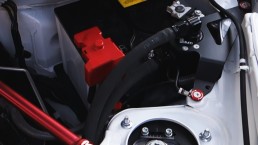Oil catch cans (also sometimes referred to air/oil separators) can look great in the engine bay, but are they really necessary, and if so, what do they do? If this is something you’ve been wondering about, then this article is for you.
An engine is a lot more complex than just suck, squeeze, bang, blow. There are a number of subsystems at play which all do specific things in order to keep your engine running properly. One of these subsystems is the vacuum system. The vacuum system does all kinds of things inside your car, from ventilating the engine internals, to providing assisted braking power.
One of the by-products created when running an engine is oil vapour. This vapour makes its way through the vacuum system, and back in to your air intake and throttle body, where it has a number of detrimental effects. This is known as oil blow-by. The amount of blow-by produces depends on a number of different factors, including the age of the engine, as well as what’s being demanded of it. On a typical road car, driven at relatively low RPM for most of its life, the amount of blow-by produced will in most cases be negligible, however in high performance engines, quite a lot can be produced, especially if they’re getting on in age, or being driven hard most of the time.
So what are some of the problems that can be caused by oil blow-by:
- It leaves an oily residue throughout your vacuum and intake system which can over time clog valves, sensors, etc. This is particularly dangerous for boosted cars, as it can cause your blow-off/bypass valve or wastegate to stop functioning properly, or in some cases at all. This in turn can lead to over-boost which could destroy your engine. Other problems include clogged Mass Airflow and Manifold Absolute Pressure sensors, which can lead to incorrect values being sent to the ECU, which can in turn degrade performance significantly, as well as cause permanent damage to your engine.
- It can pool in your intercooler and reduce cooling efficiency.
- It makes its way through the throttle body and in to the combustion chamber, where it can cause a number of problems. By adding oil to your air/fuel mixture you lower the octane level, and the result is inefficient combustion which not only produces less power, but creates soot which clogs injectors, spark plugs, cylinders, pistons and your exhaust.
- Increased Hydrocarbon emissions, which are bad for the environment.
An engine is a lot more complex than just suck, squeeze, bang, blow. There are a number of subsystems at play which all do specific things in order to keep your engine running properly. One of these subsystems is the vacuum system. The vacuum system does all kinds of things inside your car, from ventilating the engine internals, to providing assisted braking power.
One of the by-products created when running an engine is oil vapour. This vapour makes its way through the vacuum system, and back in to your air intake and throttle body, where it has a number of detrimental effects. This is known as oil blow-by. The amount of blow-by produces depends on a number of different factors, including the age of the engine, as well as what’s being demanded of it. On a typical road car, driven at relatively low RPM for most of its life, the amount of blow-by produced will in most cases be negligible, however in high performance engines, quite a lot can be produced, especially if they’re getting on in age, or being driven hard most of the time.
So what are some of the problems that can be caused by oil blow-by:
- It leaves an oily residue throughout your vacuum and intake system which can over time clog valves, sensors, etc. This is particularly dangerous for boosted cars, as it can cause your blow-off/bypass valve or wastegate to stop functioning properly, or in some cases at all. This in turn can lead to over-boost which could destroy your engine. Other problems include clogged Mass Airflow and Manifold Absolute Pressure sensors, which can lead to incorrect values being sent to the ECU, which can in turn degrade performance significantly, as well as cause permanent damage to your engine.
- It can pool in your intercooler and reduce cooling efficiency.
- It makes its way through the throttle body and in to the combustion chamber, where it can cause a number of problems. By adding oil to your air/fuel mixture you lower the octane level, and the result is inefficient combustion which not only produces less power, but creates soot which clogs injectors, spark plugs, cylinders, pistons and your exhaust.
- Increased Hydrocarbon emissions, which are bad for the environment.
Check out more Reviews by Boosted Media
May 12, 2017
New Boosted Autos Project Car REVEALED!
June 13, 2015
What are Oil Catch Cans for?
September 7, 2014



